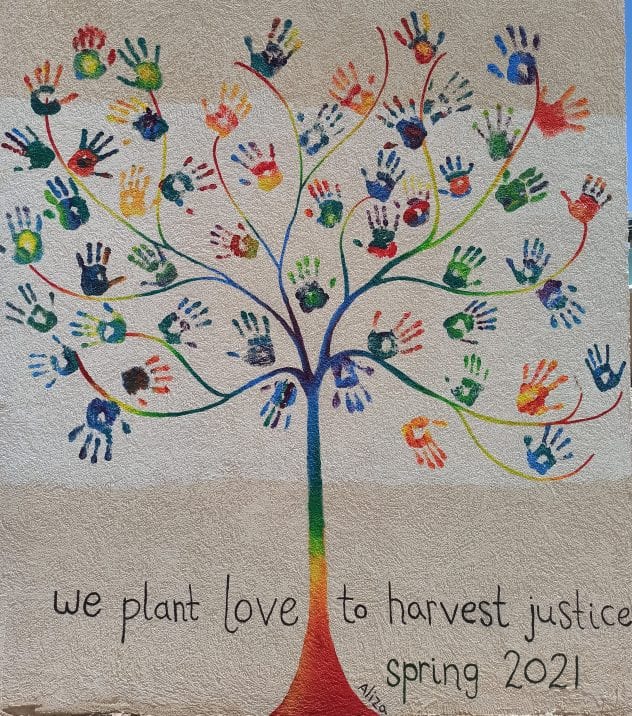Coming to the Arava Institute was somewhat of an impulsive, last-minute decision for me. It was not something I’d considered doing until I was struck by a sort of lightning. It burst suddenly into my mind with the feeling that this was not simply something to think about doing, but truly the only way to go. I’ve learned in my past years of travels and adventures that when I have a strong gut feeling, it is wise to follow it. Accordingly, when I understood this was what I wanted more than anything (a month after applications had already closed), I had to work hard to kick down some doors to be accepted. It was a process, and one that seemed unlikely to have the results I hoped for, but the intense draw of the beautiful community I imagined made it simple to work through the obstacles. I pictured a place where stimulating conversation is the norm, where disagreement and conflict are met with curiosity and as tools for growth, and where close friendships grow quickly and with strong roots anchored to a deep, layered understanding of each other. I can say genuinely that my hopes and expectations were greatly surpassed.

Those who come to the Arava Institute are those who seek change – both in themselves and in the world at large. I certainly consider myself to be someone who looks to create change in both these ways, but my experience at the Institute really revealed to me the extent to which I have both the desire and power to make this change. An overwhelming drive for action awoke in me in the face of the acute hardships we faced. Many of us felt hopeless and helpless, as though we were drowning in every new headline and article we read, faces glued fearfully to screens as we awaited more bad news. I was one of those who drowned, and then was born anew. I accepted that yes, we can’t stop what is happening. And no, we won’t be able to fix all that is so broken. But that doesn’t mean we shouldn’t be trying our best to do something, even if it feels that the impact could never be wide enough. Some students very explicitly called for action, feeling that we had passed the time when it would be enough to merely speak about what was happening outside the gates of the Kibbutz. So we took to the streets to protest (well, Route 90 through the Arava to be exact), where we held signs calling for an end to occupation, to free Palestine, to save the Sheikh Jarrah neighborhood, to promote equality, and for political change. We watched and discussed films together that showed the oppression enforced by occupation, and the grief and anguish weighing on all sides. We created art to symbolize our unified struggle for justice. We created art explicitly calling for an end to occupation. We worked together to understand perspectives and narratives different from our own, and to find ways to bridge the gaps.
There will always be more questions than answers, and there is beauty in this. It wasn’t easy coming to this realization over the past months, as I am plagued by the natural human desire for full understanding and yes, answers. But I find myself believing strongly now in the importance of questioning what I hold as truth, and of asking infinite questions of the world around me so that I may continue to learn and expand. As students of the Institute, putting ourselves in the position of questioning often was uncomfortable and sometimes even painful. It is often necessary to admit what we don’t know, and sometimes to challenge what someone else holds as truth. But as we questioned more, more doors opened. A personal question arising for me now is this: What could I gain from returning for another semester at the Arava Institute? What seems most obvious to me is that there remains SO MUCH MORE to be gained from this welcoming, intellectual, challenging, creative, compassionate, adventurous, pioneering, and revolutionary community. One of the transformative lessons I learned over the semester was of my ability to be a leader. I felt myself coming into my own power, strengthened by the unbelievable support and encouragement from both the students and staff. I felt encouraged to actualize ideas, to push my boundaries and step outside my comfort zone, to engage in conversations that made me uncomfortable, and to say “yes” more easily to both opportunities and requests for help. I enjoyed my classes to an almost absurd extent, and feel that everything I learned about the environment and politics, and the crises related to both, strengthens in me the desire to take action. This desire is not new, but it is growing. And if it is in the cards for me to return to the Institute for another semester, I feel this desire and the skills associated with it will indeed continue to grow and blossom. I have new questions now that I didn’t even know how to ask when I started the semester. However, I wouldn’t have felt comfortable speaking up to ask a single question if it weren’t for the bright, warm, accepting people who form the foundation of the Arava Institute experience. I am blessed to say that I made friends I genuinely hope (and expect!) to have for many years to come. They are people who make me laugh, make me think, make me feel connected to something deep and lovely in this human experience. More than anything, I’m walking away from the Arava Institute with immeasurable gratitude for this journey, and for the incredible people who made it so profoundly transformative.
Aliza Seagull, Spring 2021 alumna

